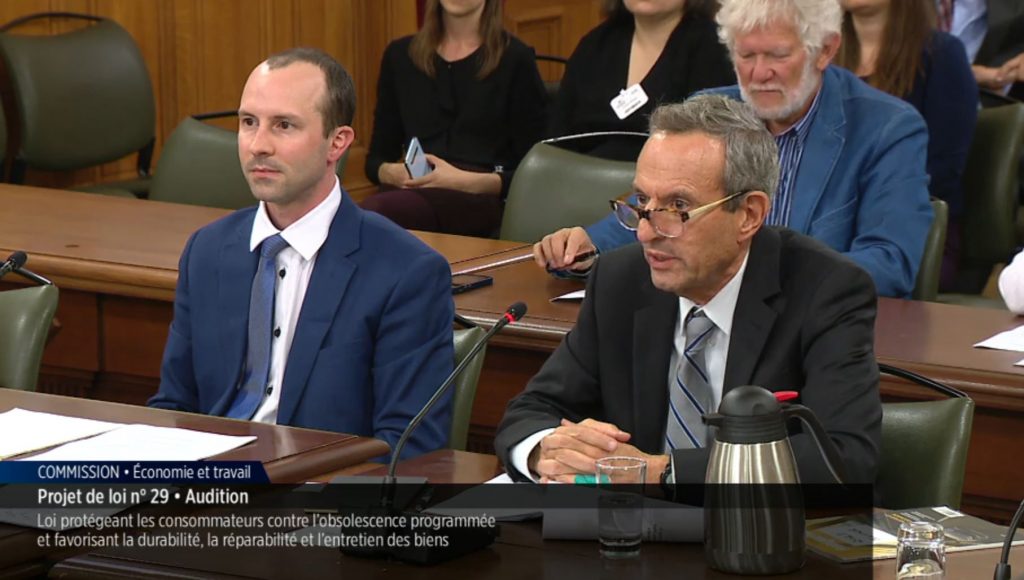In September, APA Executive Director George Iny, and lawyer Hubert Lamontagne appeared before a committee of Quebec’s National Assembly, the provincial legislature, to support legislation that would see new car buyers in the province receive additional protection when they purchase a problem vehicle. The amendment will make it easier to prove a vehicle is seriously defective. Under the proposed new rules, a vehicle will be considered “seriously defective” if it has returned to the dealer three times or more for the correction of a significant problem in its first three years in service. It could also be considered “seriously defective” if it has visited the dealership 12 times or more for the correction of various problems, or if it has been off the road for 30 days or more while waiting for a warranty repair in the first three years. (In a late amendment, days off the road won’t count if a courtesy loaner is supplied to the vehicle owner or lessee.)

An easier case to make
During its presentation, the APA stated that the current law which requires a consumer to prove that the vehicle is unfit or has a hidden defect can be a hurdle to making a valid claim, because it can require finding a mechanic or an engineer to testify as an expert witness. Most engineers who go to court as expert witnesses already have automakers or insurance companies as clients, and mechanics don’t like to testify. Furthermore, the evidence required can be very difficult to establish, given that the people who manufactured the vehicle and the dealership that is servicing it may be unable to identify the nature of the defect that is causing the malfunctions.
With the new definition for a lemon, the evidence you’ll need to prove is in your calendar. In Quebec’s proposed amendment it will be a certain number of visits, or a certain number of days off-the-road within the first three years. In its brief, the APA referred to court decisions cancelling sales where vehicle owners reported 23 unsuccessful visits in one case, and 19 unsuccessful visits in another. One plaintiff made 41 visits to their dealership over 42 months, and another’s vehicle was off the road for 78 days! In every one of those situations, the automaker refused to take back the customer’s vehicle without the intervention of a court. The cases demonstrate clearly that the carmakers as a rule don’t believe they should take back seriously defective vehicles.
The entire hearing can be seen in French on
the Assemblée nationale du Québec website.
Carmaker lobby did not dominate
Although all 50 US states have lemon laws, the car industry lobby has fiercely opposed similar protection in Canada, and proposals in Ontario and British Columbia never made it into law.
In Ontario, the two principal carmaker associations routinely warn that the introduction of robust consumer protection legislation may negatively impact their members’ decisions to invest in new plants. The Province of Quebec has no automobile assembly plants and is currently giving very generous subsidies to support vehicle electrification. Quebec’s Minister of Justice Simon Jolin-Barette did not appear fazed; he participated in the hearings and was an informed, active questioner.
Normally the new car dealer associations side with the automakers when they oppose consumer protection. At the hearings, Quebec’s auto dealer association, the CCAQ, was moderately supportive of the new requirements, asking only for reasonable tweaks in the number of repair visits and calculation for days off the road. The CCAQ stressed the need for maintaining good relations with consumers – there were no threats of closing dealerships and putting people out of work or complaints about government interference with their members’ business. The CCAQ’s position is extraordinary for a new car dealer association; it demonstrates how unique the appetite for consumer protection is in Quebec compared to the rest of the country and perhaps a narrower divide between auto retailers and their customers.
Change will come, but slowly
Quebec’s Consumer Protection Act already has powerful remedies that permit a buyer to request the return of defective goods, but the carmakers don’t recognize them. It almost always requires suing the automaker and dealer to cancel the sale of a seriously defective vehicle. Few consumers ever go that far because of the cost and delays. This new lemon definition is likely not going to make a large change in the relationship between the dealer and the customer in Quebec initially, because car manufacturers are unlikely to comply with it voluntarily.
More new vehicles are lemons
Actual lemons still comprise a small percentage of new vehicle sold, but they have become much more common than in the decade from 2000 to 2010. Changes to engines like the introduction of direct injection and widespread use of turbocharging, and the arrival of CVT transmissions, and more complex in-dash electronics have negatively impacted vehicle reliability. During the pandemic, delivering replacement parts on time became a challenge for some automakers, which they have not resolved. Some customers wait months for collision repair parts like bumpers and hoods, yet the carmakers are able to supply themselves the exact same parts to assemble new vehicles! EVs have fewer moving parts than gas engines, but they’re built on all-new platforms that can be troublesome in the first two or three years following a launch, and dealers have difficulty fixing their complex electronics on the first try. With some luck, Quebec’s initiative may start a trend that will see other provinces introduce similar remedies down the road.
